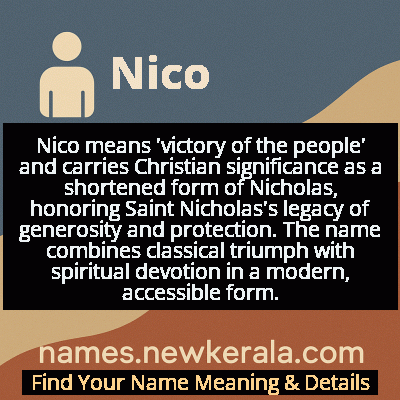Nico Name Meaning & Details
Origin, Popularity, Numerology Analysis & Name Meaning of Nico
Discover the origin, meaning, and cultural significance of the name NICO. Delve into its historical roots and explore the lasting impact it has had on communities and traditions.
Name
Nico
Gender
Male
Origin
Christian
Lucky Number
5
Meaning of the Name - Nico
Nico means 'victory of the people' and carries Christian significance as a shortened form of Nicholas, honoring Saint Nicholas's legacy of generosity and protection. The name combines classical triumph with spiritual devotion in a modern, accessible form.
Nico - Complete Numerology Analysis
Your Numerology Number
Based on Pythagorean Numerology System
Ruling Planet
Mercury
Positive Nature
Adventurous, dynamic, curious, and social.
Negative Traits
Restless, impatient, inconsistent, prone to indulgence.
Lucky Colours
Green, white.
Lucky Days
Wednesday.
Lucky Stones
Emerald.
Harmony Numbers
1, 3, 9.
Best Suited Professions
Sales, marketing, travel, entertainment.
What People Like About You
Versatility, charisma, adventurous spirit.
Famous People Named Nico
Nico Rosberg
Racing Driver
2016 Formula One World Champion
Nico Hulkenberg
Racing Driver
Record holder for most Formula One starts without a podium finish
Nico Tortorella
Actor
Starred in TV series 'Younger' and LGBTQ+ advocate
Nico Hischier
Hockey Player
First overall pick in 2017 NHL Draft and New Jersey Devils captain
Name Variations & International Equivalents
Click on blue names to explore their detailed meanings. Gray names with will be available soon.
Cultural & Historical Significance
Extended Personality Analysis
People named Nico are typically characterized by a dynamic blend of confidence and approachability, often displaying natural leadership qualities combined with strong social intelligence. The name's victory-oriented roots tend to manifest as competitive drive and ambition, balanced by the Christian associations of compassion and community focus. These individuals usually possess quick wit, adaptability, and the ability to inspire others, making them effective in collaborative environments. Their personality often reflects the name's international nature—cosmopolitan, culturally aware, and comfortable in diverse social settings. The protective aspect derived from Saint Nicholas often translates into loyalty and reliability in personal relationships, while the competitive edge drives professional achievement.
Modern Usage & Popularity
In contemporary naming practices, Nico has transitioned from primarily being a nickname to establishing itself as a popular standalone name, particularly appealing to parents seeking short, internationally recognizable names with deep cultural roots. Its popularity has surged globally over the past two decades, ranking in the top 300 male names in several European countries and gaining steady traction in North America. The name's appeal crosses cultural boundaries, working equally well in English, Romance languages, and Germanic languages. Modern usage reflects a preference for names that are both traditional and contemporary—Nico offers historical depth through its connection to Saint Nicholas and classical mythology while maintaining a sleek, modern sound that fits current naming trends favoring brevity and global accessibility.
Symbolic & Spiritual Meanings
Symbolically, Nico represents the convergence of victory and protection, embodying the ideal of triumphant goodness and benevolent leadership. The name carries the metaphorical weight of 'the people's champion,' suggesting someone who achieves success not just for personal gain but for collective benefit. Its dual heritage makes it symbolic of cultural synthesis—merging ancient Greek ideals of glory and achievement with Christian values of service and compassion. The name evokes images of balanced strength: competitive yet fair, ambitious yet community-oriented, traditional yet progressive. This symbolic richness makes Nico representative of modern global citizenship, where diverse cultural traditions combine to create meaningful contemporary identities.

